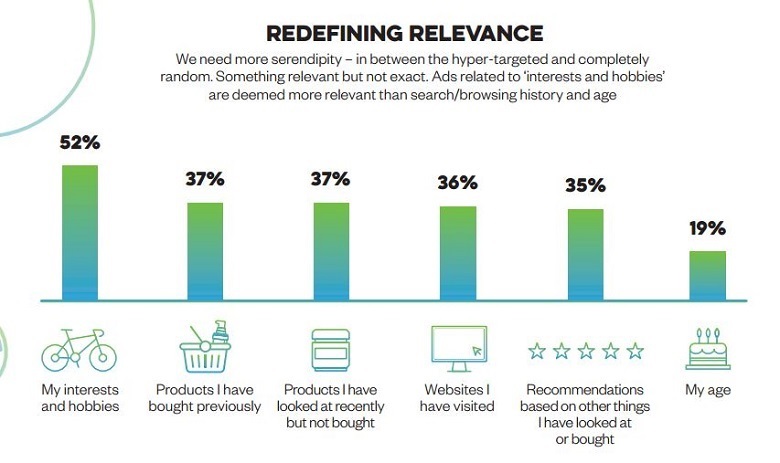Most consumers (88%) are unaware that their online experience is limited by social media and search preference algorithms, with most wanting to see more “relevant but unexpected ads” while online, according to new research.

The study, from media agency, the7stars, in partnership with Newsworks, reveals that 63% of the nation want more serendipitous online content.
The study set out to understand how brands should navigate a digital information environment where search and social algorithms create artificial information filter bubbles around individuals. It found that most consumers are not aware that their online information experiences are being limited by social media and search preference algorithms.
It also revealed that while UK consumers have a strong desire to discover fresh ideas, news or useful information, poor ad targeting is nudging them into defensive mode, where they bar or ignore irrelevant and intrusive information.
The research suggests media planners, brands and advertising tech companies need far more subtle and sophisticated approaches to digital advertising, combining planning and improved data targeting and re-targeting.
The research found consumers want more serendipitous content online from brands with more choosing positive words such as “curious” (33%), “surprised” (27%) and “intrigued” (25%) than negative words such as “annoyed” (17%) or “irritated” (18%) when asked how they feel when they see ads that are relevant but unexpected. In contrast, when asked to choose words they associate with expected advertising based on recent searches or expressed interests, the majority of consumer chose words such as “targeted” (37%), “intrusive” (30%) and “annoying” (26%) with words such as “clever” and “timely” attracting far lower values.
the7stars and Newsworks found that while consumers understand the connection between their search behaviour and online preferences with ads that are served to them, they are less clear about how social media and search algorithms limit their access to online information in general (a downloadable infographic of the results at the bottom of the page).
It found 82% of UK consumers have never heard of the term “filter bubble” and 64% do not know that their Google search results are personalised, while 65% “disagree” that the news they see on Facebook is matched to their personal profiles.
The research showed news consumption is drawn from a healthy mix of sources. While 44% said they consumed news presented by Facebook, 63% use TV news programmes and 77% consume print or digital newspaper brands. When asked which their preferred source of news was, 32% of UK consumers chose print or digital newspaper brands, 25% TV news programmes and 9% chose Facebook.
Helen Rose, head of insights at the7stars, said: “This study reveals there is a huge opportunity for brands and media owners if they pop people’s filter bubbles in a way that is sophisticated. It shows just how complex the digital world shaped by preferences, ad-blocking and algorithms has become – consumers do not mind a curated information experience so long as that is done with some thought; they simply want a better balance between targeted advertising and serendipity.
“Adopting an industry wide consumer-centric planning approach addresses this, but it will only work if we all commit to making the online environment a more enjoyable place for brands to be discovered, shared and bought.”
Denise Turner, insight director at Newsworks, added: “As we go into a general election we’ve found that almost half of news consumers would prefer not to have a news service filtered by an algorithm and most would prefer to discover new information and ideas. It also shows that while social media is an important part in people’s news diets, newsbrands are more likely to be people’s first choice for news information.”
What UK consumers say about filter bubbles and ad targeting:
- 63% of consumers say “I love it when I stumble across something useful or interesting when I’m not expecting it”
- 62% of consumers say that “discovering new ideas and things that challenge my thinking is important to me”
- 42% agree that “there is less chance and serendipity in the world today”
- 52% feel that the majority of relevant ads they see (60%+) are targeted as opposed to unexpected
- On average, respondents estimate they discover 11.2 new brands or products through online advertising a year
- 31% feel “like it is difficult to discover new brands and products which are right for me”
- 48% say “I would like brands to help me find new and different products and experiences that are right for me”
- 71% say “Google shows you search results that advertisers pay to be included”
- 42% believe that “Google search results are the same for everyone”
- 35% understand that “the news I see on Facebook is matched to my personal profile”
- 59% say they “feel bombarded by information that isn’t relevant to me”
- 72% say they “tend to visit a small selection of my favourite websites all the time”
- 47% would “like to see more adverts for things that are new to me, rather than the same old adverts over and again”
- 71% say they “blank out” ads if I see the same online ad too many times
Research methodology
The7stars and Newsworks partnered with Flamingo Research to conduct test and control experiments in London, Birmingham and Manchester – monitoring online browsing behaviour in a standard web environment and a cookie free web environment. The research also involved a quantitative online survey with 1,000 nationally representative adults aged 18-77 years of age. All fieldwork took place during January and February 2017.
